Vol.12 The second “Tokyo Food Meetup Global” is being held. The keyword for globalizing food is “clustering” [Mitsui Fudosan]
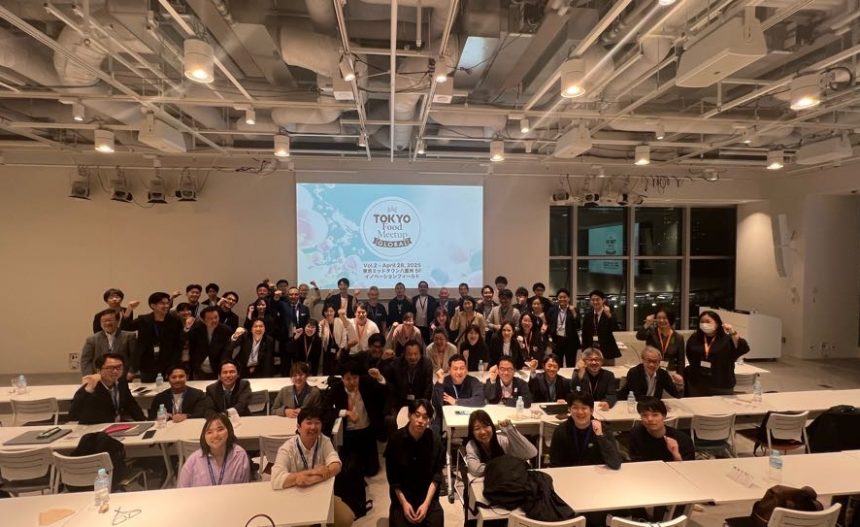
&mog by Mitsui Fudosan is a one-stop platform that supports food business development, from concept design to urban implementation. The keyword for this project, which started this spring in Nihonbashi, is “cultivating the food of the future in the city.” Mitsui Fudosan is working with food-related partner companies to carry out various activities to create new innovations.
&mog Kingdom introduces monthly events and the latest news about the project. We will report on new food trends starting from Nihonbashi!
On Monday, April 28, 2025, the second Tokyo Food Meetup Global was held at the Innovation Field on the 5th floor of Yaesu, Tokyo Midtown. 62 people participated on this day, including representatives from companies aiming to expand overseas in the food industry and companies that support them. The moderator was Hirotaka Tanaka, CEO of UnlocX Co., Ltd., and two panel discussions were held, focusing on the latest efforts of Tokyo Food Meetup Global and &mog by Mitsui Fudosan, and the globalization of Japanese food. There was also time for networking after the sessions.
1) Providing generous support for startups!
Research and development center “&mog Food Lab” opens in Nihonbashi
First, &mog’s latest initiative, “&mog Food Lab,” which just opened in Nihonbashi on February 26th of this year, was introduced. Following a video explanation by Nobutaka Yoshida of the Business Group of the Nihonbashi Urban Development Promotion Department of Mitsui Fudosan Co., Ltd., Kawamoto Takumi of Sigmaxyz Co., Ltd., which is responsible for the operation, introduced the new program, and then Ayae Osanai, representative of Shokunokai Co., Ltd., gave a presentation by an actual resident.
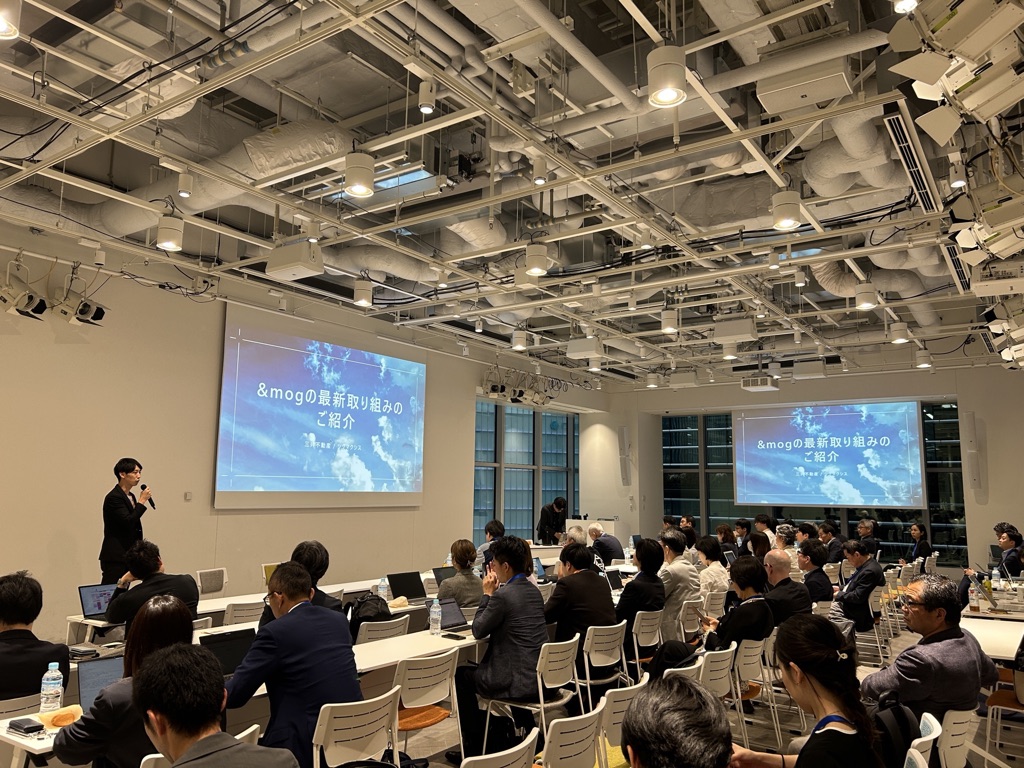
Kawamoto says, “&mog is currently a company that provides comprehensive support for the creation of food businesses, with the help of Mitsui Fudosan and various other partners, including us. &mog Food Lab was opened as a development base for products that are in high demand.”
While supporting the new business development of several companies, Kawamoto noticed common challenges that each company faced, such as “I want to input a variety of information, but I can’t keep up with it,” “The ideas end up becoming mundane,” and “I want to hear more from consumers.””So we wondered if we could create a program that could solve all of these issues at once, and that’s how the &mog Food Innovation Program was born. This program supports new business development by combining the hard assets of Mitsui Fudosan with our knowledge and network in the food sector at Sigmaxyz,” he continues.
“What this program makes possible is the ‘multifaceted input of information,’ such as what is currently happening in cutting-edge retail settings and what is happening in the digital realm.Next, we will utilize the newly completed &mog Food Lab. Here, we can receive comprehensive support from product concept creation to formulation setting, and we also have access to the kitchen on the premises. Since it is possible to obtain a manufacturing license, the products made here can be sold as is, and for companies that are reluctant to have their company name publicly displayed during the test sales stage, we have also established a system that allows a separate company to be responsible for sales.Furthermore, by utilizing the hard assets owned by Mitsui Fudosan, such as housing, offices, and commercial facilities, we can directly hear from potential customers, such as the people who will live, work, and enjoy those locations.”
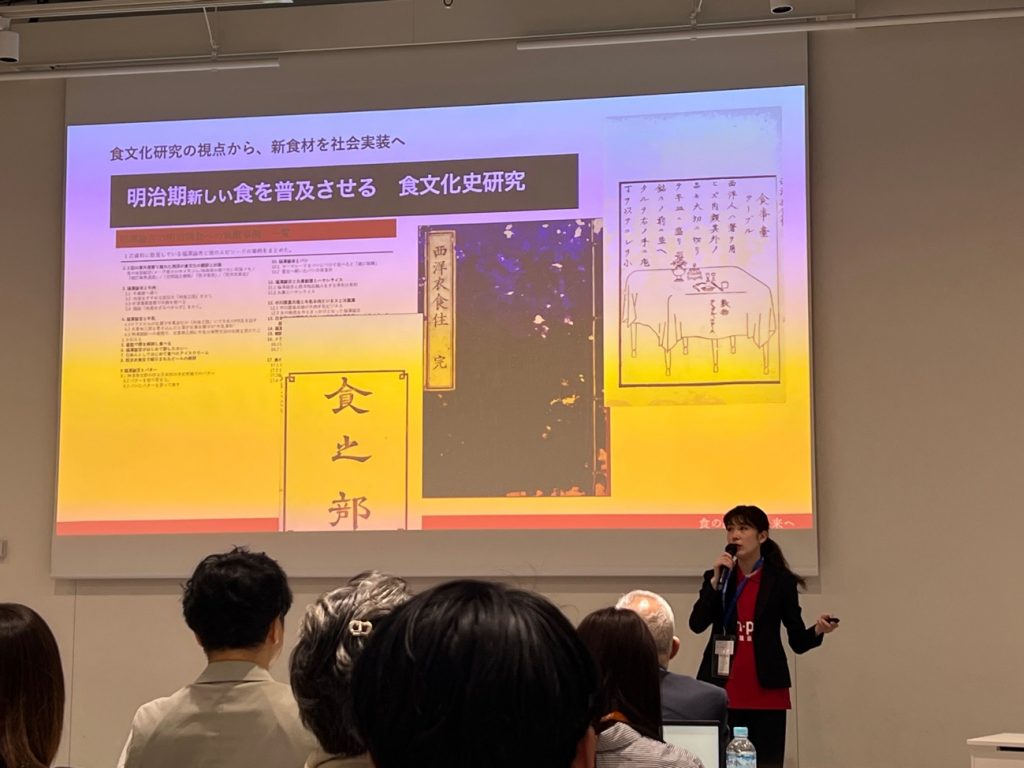
Next to take the stage was Ayae Osanai, a resident of &mog Food Lab and representative of Shokunokai Co., Ltd., which operates Shokunokai Nihonbashi, a restaurant that focuses on new foods that became popular from the end of the Edo period to the Meiji period and serves recreated dishes from that time. Osanai is also actively involved as the manager, chef, and branding officer of Fermecutes Co., Ltd., one of the startup companies that &mog supports.
Fermectes Inc. is developing “Kin-pun,” a powdered food that makes use of natto bacteria itself as a protein resource. In order to develop recipes using “Kin-pun” and conduct test sales of products, the company decided to move into &mog Food Lab, which has full-scale cooking facilities and a lounge that doubles as a social space.
“The fifth floor of &mog Food Lab is equipped with professional cooking equipment such as convection ovens, and the lounge on the first floor has a table right in front of the kitchen space, so you can make samples and then sit down to eat them straight away. We can also shoot videos to disseminate information, and it can also be used as a social space for small get-togethers and parties,” says Osanai.
In addition, all kitchens at &mog Food Lab are licensed for manufacturing, and as mentioned above, the products made here can be sold as is. In fact, the sweets made with Kin-pun that Nagauchi sold at the event “SAKURA FES NIHONBASHI 2025” held in Nihonbashi in April this year were also made here.
“Using the ingredients and new ingredients introduced by &mog, we have arranged and manufactured them at &mog Food Lab, and have visitors around town try the products. When we sell the products, we can listen to the opinions of consumers and provide feedback to the people who provided the ingredients. This kind of consistent support from production to sales is extremely helpful for a food startup, and it’s easy to use, so for us it’s a dream facility.”」
&mog Food Lab can be used for a few days or even a few hours. Nihonbashi is also where Mitsui Fudosan has its roots. We hope that the day will soon come when food startup companies will grow and take flight around the world from here.
2) Panel Discussion 1
“Considering the direction of globalization of the food industry and the necessary initiatives and mechanisms”
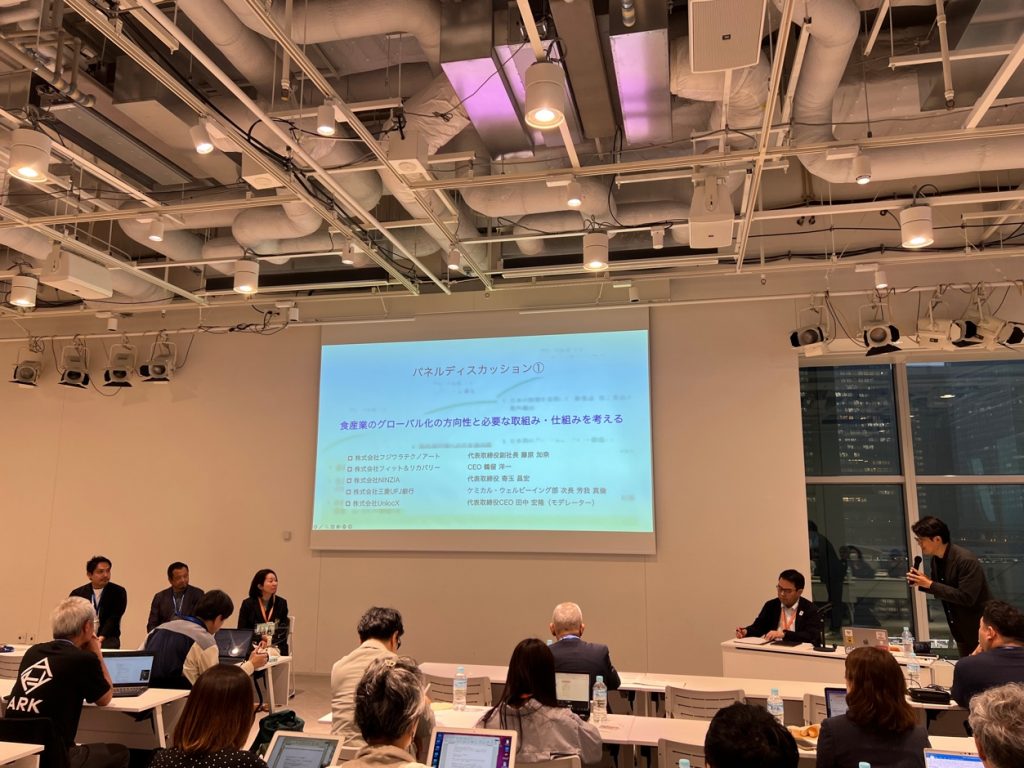
The discussion then shifted to the main topic of “globalization of food.” The first panel discussion was on the theme of “considering the direction of globalization of the food industry and the necessary efforts and mechanisms,” and brought together leading companies that are already working on the same theme. Following an introduction of each company’s business operations and efforts toward globalization, lively opinions were exchanged from each perspective.
Fujiwara Kana, the company’s vice president and representative director, spoke at the event representing Fujiwara Techno Art Co., Ltd., a manufacturer of equipment for brewing food products such as sake. The company started exporting brewing equipment 58 years ago, and has a track record of delivering equipment to 27 countries overseas. Originally, the company mainly delivered its own products overseas in conjunction with its clients’ overseas expansion, but since then, rather than leaving it up to its customers, it has begun to develop its own sales channels overseas.
Yoichi Tsurutome, CEO of Fit & Recovery Co., Ltd., took to the stage. The company develops special brown rice flour and is working to enter overseas markets so that people with gluten allergies can have a truly enjoyable food experience.Special brown rice flour is an application of the “dry low-temperature explosion” technology, which was developed through years of trial and error to make delicious buckwheat flour. It is crushed by the force of collision between materials in an ultra-low temperature environment without using water, resulting in a fine texture and a taste and ease of use that is completely different from conventional rice flour.They plan to develop and export gluten-free dried noodles made from 99% rice flour. Masahiro Yoritama, CEO of NINZIA Co., Ltd., focused on konnyaku, a traditional Japanese food ingredient, and developed a technology to extract natural dietary fiber from konnyaku yam.By using this as a binder between ingredients and combining it with other raw materials, it will be possible to manufacture gluten-free waffles, fortified snacks (cereals), and products suitable for vegans and vegetarians. In 2024, the company was selected as the only Japanese company to be a finalist for the Healthy Food Award at the international food tech event “Food 4 Future – Expo FoodTech 2024,” and its efforts have attracted global attention.
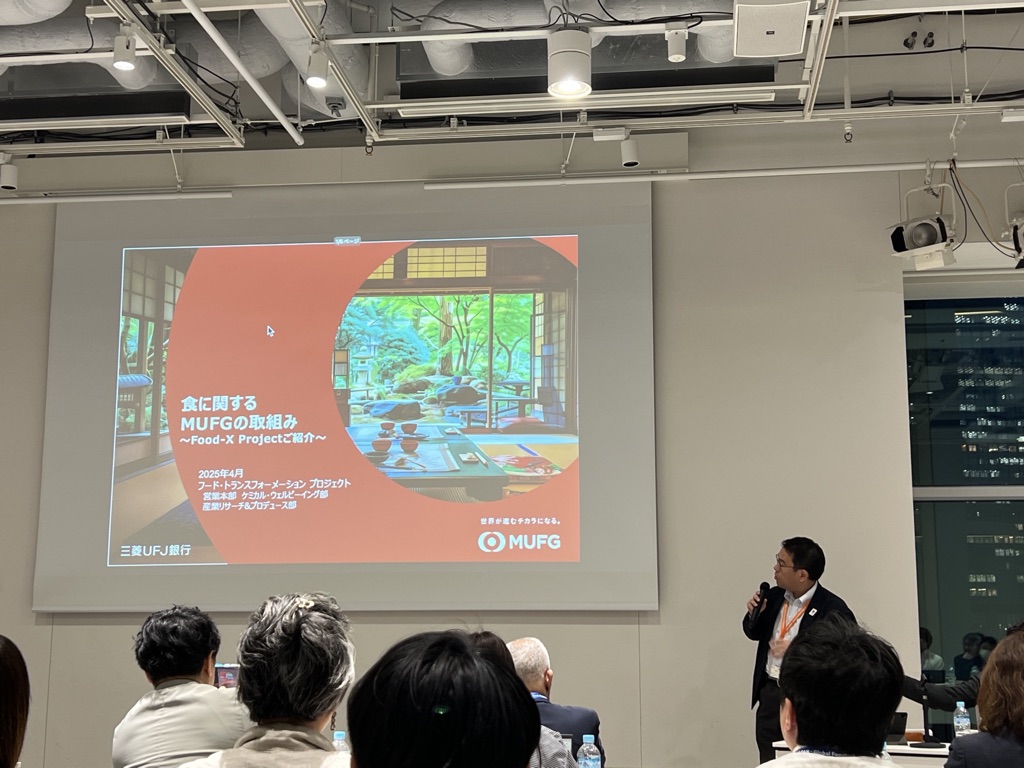
Representing the financial industry, which aims to support such startups, Masatoshi Haga, Deputy General Manager of the Chemical Wellbeing Department at Mitsubishi UFJ Bank, Ltd., took the stage. The bank launched the Chemical Wellbeing Department three years ago with the goal of contributing to solving social issues through food. He introduced examples of how the bank acts as a bridge between local governments and companies overseas, with the aim of building a resilient food system and improving individual wellbeing.
Each company’s globalization efforts had their own unique characteristics, and it seems that many companies that are about to begin full-scale overseas expansion, as well as those that are already working on it, were able to take home many hints and insights.
3) “Collective Actions – Crossing Boundaries” What actions should be taken “as a group” to globalize the food industry?
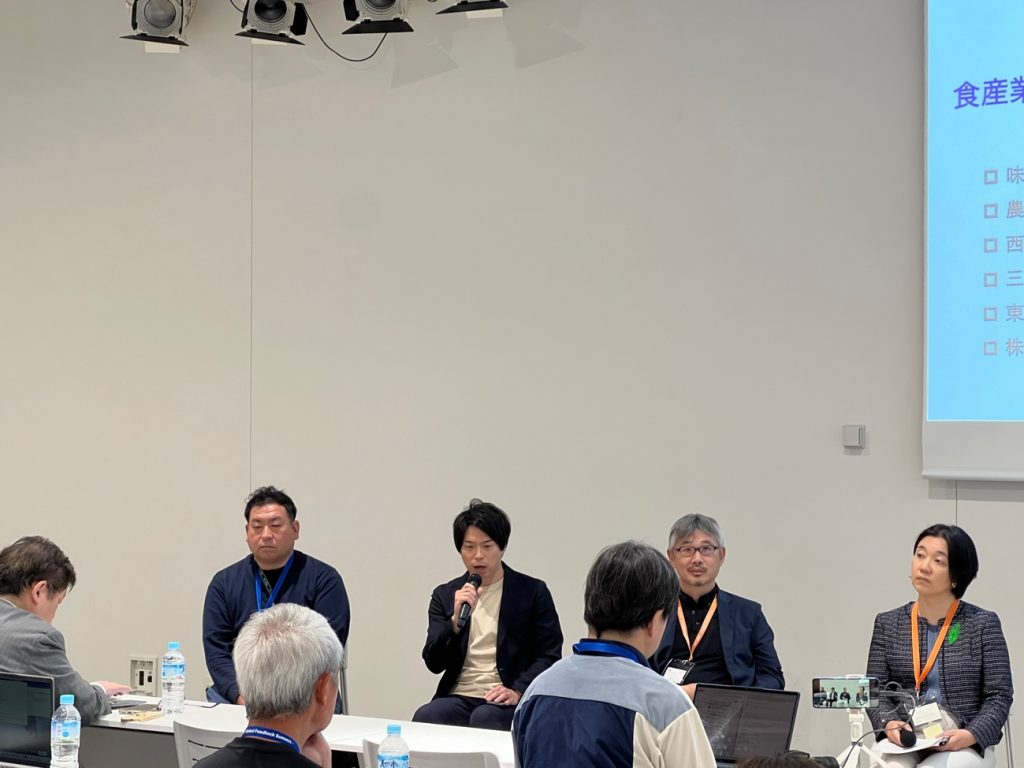
The second panel discussion was about the significance of working on the globalization of the food industry. Ideas for creating projects aimed at the globalization of the food industry that have been discussed at the past three Tokyo Food Meetup Globals were projected on the stage, and the discussion proceeded while looking back on the process.
Moderator Tanaka said, “Japan is producing a succession of globally competitive products, and there are many professionals who want to support this. As a result, there are also calls for an infrastructure for small-scale transactions in international logistics. When expanding overseas, doing business with major companies like Walmart requires a huge production system and investment measures, but if they can connect with channels like Japanese supermarkets that have stores overseas, it might open up possibilities for small businesses and startups to enter the market.
Furthermore, there is a movement around the world where intermediate organizations in various genres called “clusters” are being formed by individuals and groups with the same goals, and are beginning to connect with each other. However, these efforts are still fragmented and in a granular state. That is why I think we need a mechanism to connect them. So this time, I would like to focus on the keyword “clustering” and discuss it,” he said, explaining the purpose of the discussion.
The first panelist to speak was Hideki Katagiri, a lawyer at Nishimura & Asahi Law Firm.
“I work in the field of creating innovation specializing in food culture. I also provide support for new ingredients both domestically and internationally, so I am constantly working on global issues. I feel there are missing pieces in the distribution and retail functions, and I believe that if we can make these visible, we can move forward.”
Akiko Iida, Head of the New Business and International Group, New Business and Food Industry Department, Minister’s Secretariat, Ministry of Agriculture, Forestry and Fisheries, who participated from the government, began by explaining her thoughts, saying, “I am in charge of creating new businesses such as food tech, as well as issues such as human rights and the environment that the food industry faces in the international market. From the discussions so far, I feel that food-related technology is a great strength when it comes to exporting Japanese agricultural products and expanding the food industry overseas.”
Yoshiyuki Ozawa, head of the strategy group in the Green Business Promotion Department at Ajinomoto Co., Inc., said, “I am currently developing new businesses to spread food that contributes to the global environment to the world.Specifically, last year we launched a brand called Atlr.72™ in Singapore, where we sell ice cream from a food truck. The ice cream is made with Solein®, a protein made from carbon dioxide.Solane is yellow like beta-carotene, and in China, yellow is the color that represents the earth. So we designed the scooped ice cream to represent the earth, with the message of filling it with flowers and birds. We’ve noticed a lot of things after selling it for about half a year, so we’d like to share them with you here,” he continued.
Kakino Akira, a senior manager of the business group in Mitsui Fudosan’s Nihonbashi Urban Development Promotion Department, reflected on the &mog project so far, saying, “The project was launched in March of last year, and although progress has been made with the measures, we are currently struggling to secure internal resources. I think this is because we have not been able to convince upper management that the project will grow. We would like to incorporate elements of globalization and paint a growth story for it.”
Akihiro Sawada of Tokyo Tatemono, who is also promoting food-themed urban development, said, “Our company has been working on the globalization of food since around 2017. First, in 2019, we partnered with an Italian food-related company. This gave us the opportunity to learn about the current state of food and trends from a global perspective. Last year, we partnered with the Basque Culinary Center in Spain and established a food university called the Gastronomy Innovation Campus Tokyo near Tokyo Station. We work every day thinking about how we can become a global bridge for our players.”
Tanaka continued, “Not only do we want to go out into the world, but we also have no choice but to globalize our food industry, in the sense of opening up the potential of Japanese food to the world. We see this both as an opportunity and a sense of crisis that we might miss the opportunity.” He then asked, “Why are you working on globalizing the food industry now?”
In response, Katagiri commented, “In the past, Japanese food was restricted by distance when it came to entering overseas markets. But with the development of technologies such as freezing and powderization, it is now possible to provide the value of Japanese food as it is. Now that we are no longer restricted by distance, I feel that it is the perfect time to move forward with globalization. Furthermore, if we can achieve the ‘intellectual property rights of food’ that include Japanese food culture and know-how about excellent processing technologies, I believe Japanese food will be able to become mainstream in the global food industry.”
Iida of the Ministry of Agriculture, Forestry and Fisheries said, “It may seem paradoxical, but globalization is also important for the sustainable development of Japan’s food industry. While Japan has the problem of a declining population, it also has advanced food technology. As a country that is advanced in facing challenges, I feel that now it is necessary for it to tackle globalization.”
Tanaka then asked, “In order to globalize Japanese food, what do you think we should seriously do to work together as a group, starting from the individual grains?”
Ajinomoto’s Ozawa commented, “If a startup company actually wants to expand its business overseas, surely there needs to be a system that allows back-office functions such as tax, legal, and quality assurance to be shared with startups and SMEs that are working to globalize. It would be great to have a system that makes such functions open, so that you can only pay to consult an expert when you are really in trouble. At Ajinomoto, we have specialists in-house and are always on the lookout for information. I feel that way because we have an environment where we can receive immediate support.”
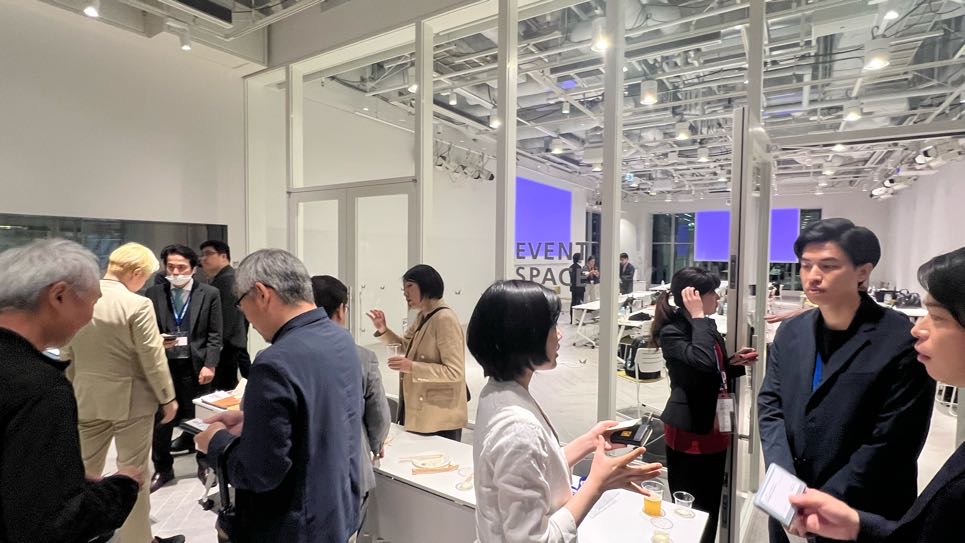
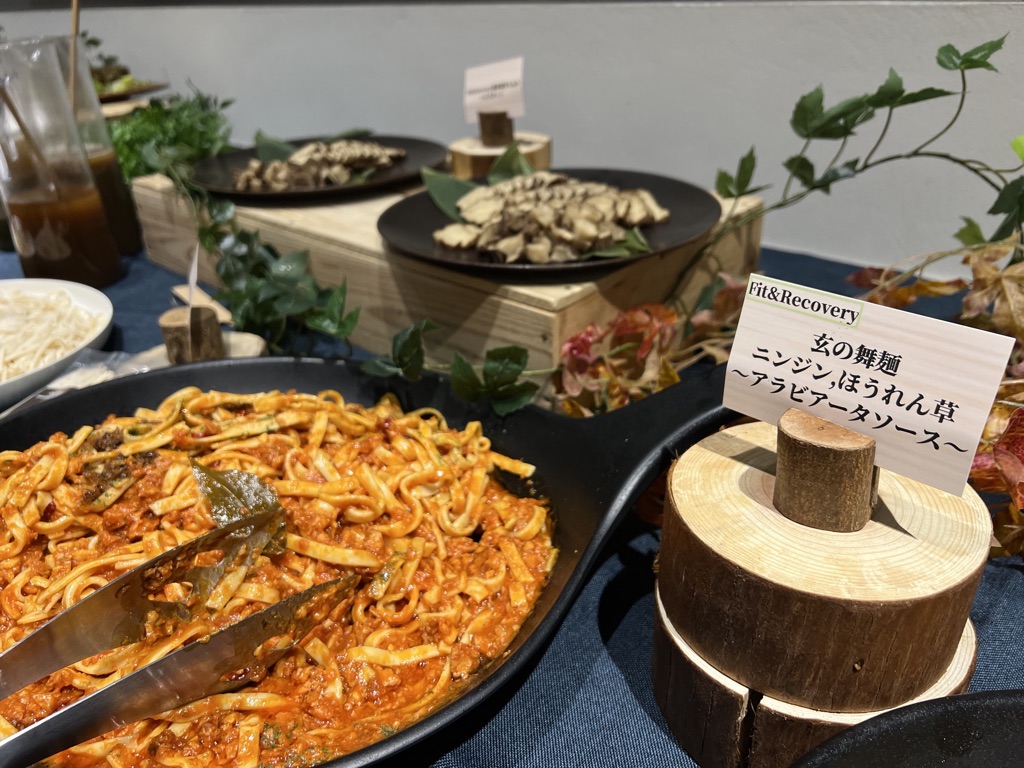
In this discussion, while there was a common understanding of the importance of moving from particles to groups, it was also made clear that in order to achieve this, a leader is needed, and a common understanding is needed to push the initiative forward. Opinions were exchanged from each perspective, and the discussion deepened, making for a meaningful time.
To conclude the discussion, Tokyo Tatemono’s Sawada left some powerful comments.
“This year, I would like to have a competition that will generate innovation. I want Japanese food tech to eventually become the world’s center, so this year I would like to work with everyone to generate innovation.”
Connections that transcend the boundaries of industry genres are essential to the globalization of Japanese food. The event ended with hopes that further discussions will continue and that this will become a forum for grains to come together and aim for the globalization of food.
■Credits
Text: Hanayo Tanaka
Photo: Akiko Okada





